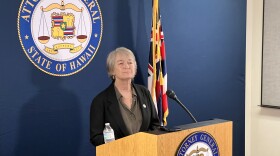Gov. Josh Green announced last week that the state was planning to take several legacy oil companies to court over alleged deceptive marketing practices around fossil fuels and global warming.
But the day before the state filed its lawsuit against the oil industry, the federal government filed its own complaint against Hawaiʻi in an attempt to block the state's legal action.
The federal government's complaint claimed Hawaiʻi's anticipated lawsuit would interfere with "a national effort to secure reliable sources of domestic energy."
The complaint echoed language from a recent executive order issued by President Trump that called on the U.S. Department of Justice to block states from enforcing climate change laws or pursuing legal action related to greenhouse gas emissions.
"We were all surprised by this lawsuit because it is so nonsensical, but we're not surprised that they would seek to retaliate," said Hawaiʻi Attorney General Anne Lopez, adding that the Trump administration made such intentions clear with the executive order.
"This administration has demonstrated a willingness to retaliate against anyone and everyone who will not fall in line with whatever their latest policy idea is," she said.
The DOJ sued the state of Hawaiʻi over a lawsuit it had yet to file. Can they do that?
In its complaint, the federal government is seeking something called declaratory relief, which generally "allows the government to seek a declaration from the courts on a topic before it ripens into a full blown dispute," said Richard Wallsgrove, the co-director of the environmental law program at the University of Hawaiʻi William S. Richardson School of Law.
But Wallsgrove said he's unaware of any other instance in which declaratory relief has been invoked to stop a lawsuit that is about to be filed.
Wallsgrove views the federal government's complaint as an attempt to squash Hawaiʻi's lawsuit "before it ever sees the light of day."
The federal government is "sort of using the court as a site of cultural performance, as opposed to a place where you go to seek legal relief," he said.
Now that the state has filed its lawsuit, Lopez anticipates the federal government will amend the complaint to include specific allegations.
"There's a statement in there that basically says only Hawaiʻi knows what's in the lawsuit," she said, "which is sort of a silly thing to put in a complaint, because they're admitting they have no facts to base this lawsuit on."
State joins Honolulu, Maui counties in climate litigation
Hawaiʻi has joined a growing chorus of states and municipalities, including Honolulu County and Maui County, that are seeking damages from fossil fuel companies over climate change harms.
Although they share a core argument — oil companies misled the public about how their fossil fuel products were contributing to climate change — the state's lawsuit differs from the Maui and Honolulu cases in a few important ways.
The state claims that the oil industry's deceptive marketing practices have damaged Hawaiʻi's public trust resources, which the state has a constitutional obligation to protect.
"The state's complaint asks the basic question: When someone lies, who pays for it?" said Deputy Attorney General Wade Hargrove.
He argued that Hawaiʻi’s constitution mandates that the state hold the oil industry, rather than the taxpayer, accountable for the cost of those damages.
The public trust doctrine was also cited in the Navahine lawsuit, in which a group of young plaintiffs argued that the state Department of Transportation's policies promoted the continued use of fossil fuels. Last summer, the plaintiffs reached a landmark settlement with the state.
The state has been considering filing a lawsuit against legacy oil companies for some time, according to Lopez.
She added that the harms the state is facing as a result of climate change were brought into sharp relief after wildfires devastated Maui in 2023.
Lopez called global warming an "existential threat" to Hawaiʻi and the Pacific.
"This lawsuit is in direct response to that threat," she said.






